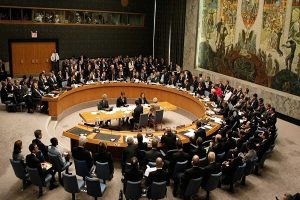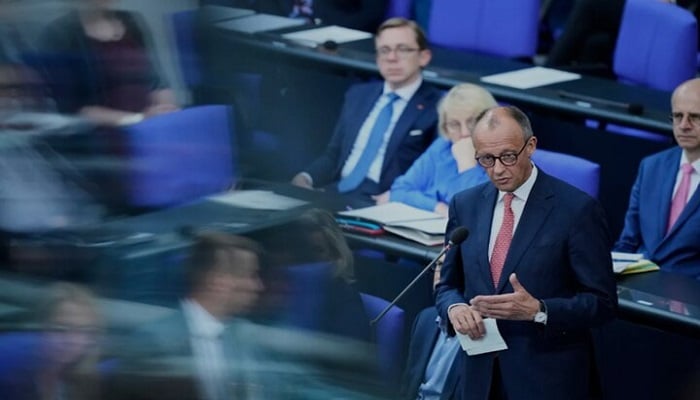PNN – Germany has not only not remained silent in the face of historical crimes against Iran, but has also played a clearly destructive role, from equipping Saddam with chemical weapons to covering up the recent aggressive attack by the Zionist regime.
While the world watched in astonishment as the Zionist regime’s aggressive attacks on Iranian soil, and international public opinion was shocked by the martyrdom of approximately 1,100 Iranian citizens, including defenseless women and children, German Chancellor Friedrich Mertz, instead of condemning the attack or even maintaining diplomatic silence, surprisingly called it a “legitimate act.”
Meretz stated bluntly at the G7 summit: This is what Israel is doing for the security of all of us; a sentence that was not only a complete disregard for the principles of international law and the UN Charter, but also had the dangerous smell of whitewashing crimes against civilians.
A few days later, in a reaction that more closely resembled a dictate from Tel Aviv, the German Chancellor again emphasized the legitimacy of the Zionist regime’s operation in the country’s parliament, stating bluntly that “there is no doubt about its legality,” a statement that even drew criticism from some European media outlets.
Read more:
Haaretz reports Zionist displacement crisis as a result of Iranian attacks.
This stance, especially in a situation where even some Western institutions such as the Red Cross and Human Rights Watch have called for an investigation into the “ratio of civilian casualties to military targets” in this attack, raises important questions about the moral standing of the German government.
This article will refer to cases of conspiracies and Berlin’s historical cooperation with the aggressors against Iran.
- Saddam’s chemical weapons: Germany’s service to a war criminal
During Iraq’s eight-year imposed war against Iran, when Iran was resisting under bombing and chemical attacks, hundreds of German companies, with the coordination and tacit support of the West German government, provided the Iraqi Baath regime with the equipment, technology, and raw materials necessary to manufacture chemical weapons.
According to an official report by the German Federal Institute for the Protection of the Constitution, more than 110 German companies were directly or indirectly involved in Iraq’s chemical weapons program. This involvement was not covert, but in many cases through officially registered exports and with the knowledge of the German government.

Among the notable collaborations was participation in the establishment of the Samarra factory in Iraq, a complex specifically designed to produce deadly gases such as tabun, sarin, and mustard. This plant became the backbone of Saddam’s chemical arsenal and was later used in disastrous attacks such as the chemical bombing of Halabja and the anti-Iran operations in the Faw and Majnoon regions. Thousands of civilians, including Iranian and Kurdish women and children, were direct victims of these gases, which were produced with German technology and materials.
As part of a secret project called Project 922, German companies sent more than 1,027 tons of chemical raw materials to Iraq. Documents released by the United Nations and reported in media outlets such as the Washington Post in 1992 showed that at least six German companies were involved in supplying biological equipment for growing and concentrating microbial agents, equipment that had the potential to be used as a means of mass destruction.
- Germany’s silence on the assassination of Iranian nuclear scientists
Iran witnessed the assassination of at least five of its leading nuclear scientists, including Masoud Alimohammadi and Majid Shahriari. Although the Zionist regime was the main suspect in these operations, the more important point was the significant silence of Western countries, including Germany, which not only did not condemn these assassinations, but some of their officials implicitly described them as a step “necessary for international security.”
In 2012, the German newspaper Der Spiegel quoted an intelligence official as saying: Shahriari’s assassination showed that there are still ways to stop Iran without bombs. These anti-Iranian positions in the German mainstream media not only legitimized the space for hostile actions, but ultimately helped cover up crimes that were clearly in conflict with international law.
- Cyber-warfare; the first government cyber-attack with Stuxnet
In the summer of 2010, malware called Stuxnet was first discovered, specifically targeting centrifuge monitoring and control systems at the Natanz facility. The Institute for Science and International Security (ISIS) reported that between November 2009 and January 2010, an estimated 900 to 1,000 devices were disabled.
Although this sabotage was not carried out directly by Germany, the role of German researchers and companies such as Siemens in discovering and disseminating the vulnerability capabilities of the Process Control System (PCS 7) was exploited. The US National Laboratory, INL, in collaboration with Siemens in 2008 identified system vulnerabilities that were later used in the creation of Stuxnet. This collaboration demonstrates Western technological complicity in facilitating cyber-threats against Iran.
- Industrial espionage and technological deception; stealing science and limiting Iran’s growth
In recent decades, Iran has been the target of Western scientific containment policies, particularly through informal channels such as dual research projects and technological espionage. Germany played a role in the controlled transfer of knowledge while identifying Iranian scientists through cooperation with ostensibly international research institutions in the fields of energy, biotechnology, and aerospace. Dozens of joint projects in the form of short-term scientific courses were practically used as a cover to gather information about Iran’s domestic capabilities in the fields of nanotechnology, nuclear medicine, and advanced engineering.
- Drug embargo and silent death: Germany’s participation in economic warfare
While the European Union has always claimed to adhere to human rights principles and humanitarian considerations, the actions of its member states, especially Germany, during the unilateral sanctions imposed after the US withdrawal from the JCPOA clearly contradicted this claim. At this point, although pharmaceutical items have been officially excluded from the sanctions list, the reality is that European banks, mainly German banks, under pressure from threats from the US Treasury, have refused to conduct any financial transactions related to medicines, medical equipment, and pharmaceutical raw materials with Iran. This policy of “hidden financial sanctions” has effectively disrupted Iranian patients’ access to vital medicines and, in the shadow of Berlin’s official silence, has become a silent tool for pressure on the civilian population.
The results of these measures have been clearly evident in crises such as the coronavirus pandemic and in the area of special patients. According to official statistics from the Iranian Ministry of Health, in 2019, more than 25,000 special patients faced a shortage or lack of medicine, and many of their lives were at risk. Vaccines needed for children with rare diseases also faced delays, sometimes fatal. These human tragedies were caused not by direct sanctions but by the German government’s passive and conservative compliance with the American pressure structure.
- Technological and banking sanctions: Germany’s stumbling block to Iran’s progress
Contracts for the transfer of technical knowledge, the supply of sensitive electronic components, industrial software, and even health-related technologies and medical equipment were suspended. These measures, contrary to Germany’s claim of adherence to human rights principles and a humanitarian approach, directly affected the livelihoods of the Iranian people.
However, Germany’s policy of technological and banking pressure not only did not weaken Iran’s vital infrastructure, but also strengthened its approach to self-sufficiency in sensitive areas. In response to these pressures, Iranian industries, relying on domestic capacities and knowledge-based institutions, tried to reduce dependence on imports and accelerate the path of localization of strategic technologies.
- The International System and Germany’s Silence: Obstacles to Iran’s Rights
In recent years, Germany has always been an influential player in the structure of the international system, but its performance towards Iran demonstrates a fundamental contradiction between its legal claims and political behavior.
In global forums such as the UN Security Council, Germany not only failed to condemn aggressive behavior against Iran, but also paved the way for the adoption of biased resolutions or the application of political and economic pressure through its hostile cooperation or targeted silence.
This complicity with the aggressor or silence, at critical moments when Iran fell victim to state terrorism, nuclear sabotage, or blatant violations of the United Nations Charter by other countries, effectively became a kind of green light for the continuation of unilateralist policies.

On the other hand, the German government and its European allies have repeatedly refused to officially support Iran’s legal claims in the International Court of Justice or other legal mechanisms. While Iran has attempted to challenge the Zionist regime’s aggressions or the illegal US withdrawal from the nuclear deal through legal channels, countries claiming to support the international order, including Germany, have either remained silent or have even indirectly sided with violators of international rules. This apparent duality in Berlin’s approach is evidence that the “international order” claimed by the West is defined not on the basis of justice but on the basis of political interests.

